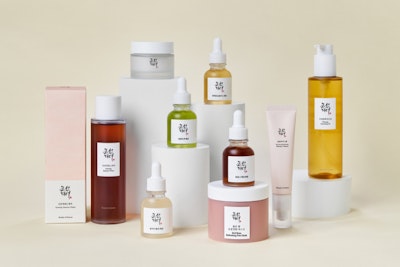Beauty Of Joseon
Korean skincare with herbal and plant-based ingredients

Beauty Of Joseon's Sustainability Rating
Harmful
Ingredients
Neither Beauty of Joseon or its parent company make any ingredient commitments. Choice of ingredients is a strong determinant of environmental impact, and Commons found that this brand still uses many ingredients that pose a significant threat to the climate, including microplastics, harmful suncare ingredients, other petrochemical-based ingredients, and uncertified palm oil or palm oil-derived ingredients. Its products incorporate some bio-based and/or biodegradable ingredients. Beauty of Joseon doesn't report having any product or company-level certifications.
Containers & Packaging
Beauty of Joseon doesn't publicly share information on its shipping materials and product containers. Packaging is a large portion of the industry's emissions and waste footprint and we hope for more transparency from brands. Beauty of Joseon hasn't made any efforts to concentrate its products or minimize its containers, which increases shipping emissions and packaging volumes.
Energy & Water Use
Beauty of Joseon doesn't share information on its energy strategy. There is no reporting from its parent company either. Beauty of Joseon doesn't provide information on any water conservation strategies. Beauty of Joseon has an unknown production span.
Refill & Reuse
Commons couldn't find evidence that this brand offers any alternative models to lower its waste footprint, such as refills or takeback programs. It doesn't provide any guidance to help customers properly recycle or dispose of its products.
Slow Consumption
Beauty of Joseon doesn't frequently release seasonal or limited edition products, which helps prevent production of excess inventory.
Marketing
Commons is still evaluating this brand's marketing emails.
Transparency & Reporting
Beauty of Joseon doesn't appear to have a sustainability page or centralized source of relevant information. Commons couldn't find a sustainability page or annual report for this brand, this signals a lack of transparency and accountability. Beauty of Joseon shares a complete list of ingredients used in its products on a per product basis.
Emissions Tracking
Commons couldn't find information on this brand's emissions tracking. We expect large brands with the largest emissions footprint to track and report their data publicly.
Targets & Offsets
Commons couldn't find emissions reduction targets for this brand. Larger brands have an outsized impact and responsibility to reduce their emissions. Commons couldn't find evidence that this brand offsets any emissions.
Supply Chain & Labor
Beauty of Joseon doesn't publish information about its supply chain partners. It doesn't publicly share a supplier code of conduct. We expect larger brands to have a public code of conduct. Its parent company doesn't have a stated policy of regularly auditing its supply chain partners. This may increase human and environmental risks. Commons couldn't find further information about this brand's supply chain and labor practices.
Advocacy
Commons wasn't able to find evidence of any trade association memberships or any relevant policy for this brand. or its parent company, Goodai Global. It isn't a member of advocacy organizations advancing climate policy. It doesn't employ any state lobbyists. It didn't donate more than $100k to climate-obstructive candidates or PACs from 2018-2024.
We avoid Beauty of Joseon because its sustainability reporting is incomplete or nonexistent, both at a brand-level and at a parent company-level.
Beauty of Joseon doesn't make any commitments related to its ingredients. Choice of ingredients is a strong determinant of environmental impact, and it uses ingredients that pose a significant threat to the climate, including petrochemical derived ingredients, and ingredients that contain uncertified palm oil or microplastics. Beauty of Joseon doesn't disclose any information about its packaging materials. Packaging is a large portion of the industry's emissions and waste footprint. It also doesn't utilize any alternative models or packaging minimization strategies to reduce its waste and emissions footprint.
Commons couldn't find reporting from this brand's parent company on its energy strategy, water efficiency measures, emissions measurement, emissions data, emissions reduction targets, offsets, supply chain details or labor practices. We expect more transparency and accountability from large brands.
Our ratings are based on a scale from 1 (harmful) to 5 (best). How we rate →
Get Rewards
Earn for sustainable purchases
Commons rewards you for sustainable purchases from all our Top Rated brands, plus thousands of everyday purchases — from thrift stores to public transit.
Learn more about rewards ->



